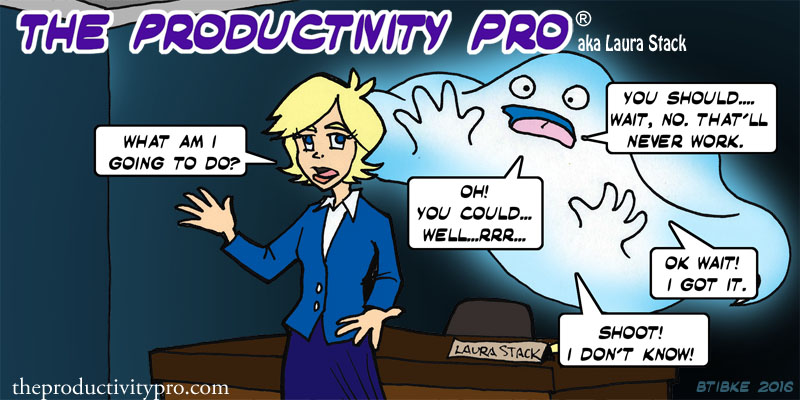“Decisiveness is a characteristic of high-performing men and women. Almost any decision is better than no decision at all.” – Brian Tracy, American motivational speaker and writer

One of the productivity topics I see discussed repeatedly in the business world is the issue of decisiveness. You’d think there would be some consensus on how to achieve it by now, but every guru seems to have his or her own process. Some will tell you to trust your instincts and make snap judgments. Others insist you build team consensus first, while still others suggest you get all your ducks in a row, then take massive action.
To some extent, they could all be correct, depending upon the circumstances and your depth of knowledge about those circumstances. However, the one thing they all agree on is this: Decisiveness matters. Sometimes, it’s the only thing that will save your productivity and add to your organization’s profitability (<---Click to Tweet.)
You’ll occasionally make bad decisions—possibly even disastrous ones. But the worst mistake you can make is not making a particular decision and allowing either circumstances or another person to eventually make it for you. And they will rarely, if ever, have your best interests at heart. That should be incentive enough to work on decisiveness if you find yourself dithering.
Let’s look at four imperative reasons stop being so indecisive:
1. To avoid analysis paralysis. If you think too long about a decision, have too many options to choose from, or decide perfection is more important than punctuality, you may freeze up and make no decision at all. This “vapor-lock of the brain” brings the work process to a grinding halt, as surely as if HR had failed to send out this week’s payroll checks—affecting not only your productivity, but also your team and, ultimately, your organization. It may not slow the company to a halt, but it does slow it measurably.
2. Agility demands it. Modern business moves at a pace that makes Ulain Bolt seem glacial by comparison. Successful organizations have to execute ASAP, often on the spot; so you may have to make snap decisions at times. Sure, it’s best to take into account other people’s ideas, especially when you’re the team lead and the project promises a big payday when handled correctly. But you can’t always do that, and even if you can, you have to make up your mind in a reasonable amount of time.
3. You own the situation. For good or ill, when YOU make the decision, you’re responsible for what happens afterward. That means you can spin the situation to the benefit of yourself, your team, and your organization, or get it back on course when it drifts off. When you step up and make a decision, you become the captain of your fate, heading in a specific direction. Even if it turns out you’ve made the wrong decision, at least you tried. You owned the situation, made the best decision you could at the time with the information you had available, and took your engagement to the mat.
4. You can fix it on the fly. While there have been instances of the wrong leg being amputated, it’s a rare decision that’s so bad you can’t fix it midway through—especially when it comes to the details. No plan ever survives contact with reality; the decision is separate from the execution. Even if your hobgoblin of perfection forces you to account for everything reasonably possible, something will still go wrong. Do you really think the city fathers of Chelyabinsk, Russia ever expected a giant meteor to explode over their city, blowing out every window in town and knocking down walls? Of course not. But they adapted existing disaster plans and kept their city from falling apart when the one-in-a-billion event actually occurred in February 2013.
Make Up Your Mind, Already
The faster you make decisions, the faster you get results—and faster results mean greater productivity. Decisiveness makes you more effective, and that makes you look better at promotion time. You can’t be afraid of making mistakes, or you’ll never come up smelling like a rose. Even if you realize you’ve made the utterly wrong decision, own it, put it behind you, and change direction in mid-flight. You’re allowed course corrections; in fact, they’re mandatory, since nothing will ever go perfectly anyway.
© 2016 Laura Stack. Laura Stack, MBA, CSP, CPAE is an award-winning keynote speaker, bestselling author, and noted authority on employee and team productivity. She is the president of The Productivity Pro, Inc., a company dedicated to helping leaders increase workplace performance in high-stress environments. Stack has authored seven books, including Doing the Right Things Right: How the Effective Executive Spends Time (January 18, 2016). She is a past president of the National Speakers Association, and in 2015 was inducted into its exclusive Speaker Hall of Fame (with fewer than 175 members worldwide). Stack’s clients include Cisco Systems, Wal-Mart, and Bank of America, and she has been featured on the CBS Early Show and CNN, and in the New York Times. To have Laura Stack speak at your next event, call 303-471-7401 or visit her website.



I was going to reply and then I thought I wouldn’t, and then I thought I had better be decisive so I thought “What a great post” Well done and keep up the great work. – Barry.
Thanks Barry!